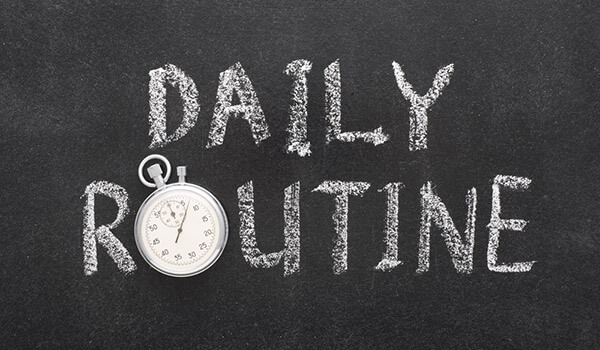
Your daily routine: It’s what guides you through your day, automating certain rituals and reminding you to do specific things at specific times. For many of us, routines form the backbone of our daily life, and we’d be lost without some form of schedule to keep us on track. They also provide invaluable support when it comes to implementing healthy habits and wellness practices; sticking to these good habits is helped immeasurably by having a routine to follow. Much has been written about the benefits to a routine, especially for creative types or those who want maximum productivity – but are there downsides to keeping a strict schedule? Do the positives outweigh the negatives? Let’s find out:
Benefits to a Routine
When you think about all of the processes your brain has to execute every day, there’s definitely the need to have some parts of your life be automated – and that’s what having a daily routine is all about. It helps redirect your mental energy towards what needs dealing with in the moment, while your routine basically runs in the background like a computer program.
A blog post at Natural Qi affirms this, adding that “having something that has become a habit or routine is useful in keeping up on the type of lifestyle you want without a ton of mental/emotional strain trying to make sure you do it right. The key is to do it enough to create the habit, and then once it’s habit or routine you JUST DO IT, rather than have to think or work to do it.” That’s a huge bonus if you’re overworked or otherwise stressed out.
Many people already have a routine built in to their lives with the 9-to-5, Monday-to-Friday work structure, but if you work outside of these traditional parameters, it’s important that you establish a daily routine – hopefully full of healthy habits – that will keep you on track in the absence of scheduled office time.
Also, a daily routine isn’t just for high-powered executives or alpha-type multitaskers – it works for anyone who wants to manage their time effectively and create a more productive day. The Redbubble blog even extols the virtues of a routine for creative people, which might seem a bit strange if you assume all creative types like to work whenever they want, however they want. Yet this method of work is deemed “unprofessional” and chaotic, and could actually be detrimental to business. Instead, scheduling tasks and sticking to a daily routine can help keep creative types on the straight and narrow.
The Possible Downsides
For as much as the benefits to a routine can help creative people, there are still more who argue that they work best when things are loose and lenient. And for anyone else who’s looking to implement a routine, there’s the chance that you might feel overwhelmed at first. It can cut down on the lack of spontaneity in the everyday, which may leave some people feeling stifled. Having a daily routine can also create a lack of flexibility in the day to day, especially if you put pressure on yourself to always mentally check off your routine’s tasks.
On top of this, there’s the chance that you may end up feeling stuck in a rut – particularly if you have a low tolerance for repetitive behavior – or become bored with your routine over time. Alternatively, you might lean too hard into the routine and become afraid to experiment or venture outside of your safe space.
The best way to keep your daily routine from harming rather than helping is to know your own limits, and to determine what works best for you. If you’re more productive with less structure, great! But if you find yourself struggling and constantly feeling like you’re crunched for time, it might be a wakeup call to start setting up some daily routines to keep things regular.
Getting the Balance Right
Much has been written about what good things a daily routine can do for us, and many people already have everyday habits that they do without trying. But if you’re living outside of a regular routine and finding life too chaotic and unhealthy, then it may be time to start planning out a daily routine and healthy habits for yourself. Structure can help, so long as you allow yourself enough flexibility to roll along with whatever life throws your way – and once you find your own personal balance.
What are some important parts of your daily routine? Are you seeing benefits to a routine? Tell us in the comments.

